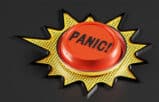Yes, believe it or not, it is national Grammar Day, the day for us to celebrate the value of effective communication. A day to rejoice that lawyers especially are wordsmiths who delight in precise oral and written communication.
Okay, you’re right, I was just joking about that last part. But it’s true that it’s National Grammar Day. You can even sing along with the anthem on YouTube.
Three Irritating Grammar Gaffes
In honor of National Grammar Day, here are the top three grammar and usage missteps I see made by lawyers (and pretty much everybody else).
1. Saying “I” instead of “me” all the time doesn’t make you sound smart or cultured. I previously wrote about this for Attorney At Work in “Sloppy Writing Sucks.” The “I or me” question usually comes up when there is a prepositional phrase (did I lose you yet?) with multiple people being referenced and ending with what should be “me.” The easy way to test for this is to remove the other names and see how it looks:
Please explain it to Merrilyn and me. (You wouldn’t say “Please explain it to I.”)
The technical explanation? “I” is the correct first-person singular pronoun (groan here) only as the subject in the sentence or clause, i.e., when “I” am doing the being or acting of the sentence:
Merrilyn and I will explain it to you.
2. There is no such word as “alot.” I had a hard time keystroking this, because spell-check automatically wanted to change it, but I still see it all the time. Once spell-check fixes it, are people going back and changing it to be wrong? “A lot” — meaning “a great many” — refers to an allotment of something. Sorry, no such word as “alot.”
3. An acronym is a special kind of abbreviation that can be pronounced as a word. The well-known organization PETA is known by its acronym. NAACP is not. If the American Bar Association were a Scandinavian singing group, it would be known by its acronym. Alas, it is called the A-B-A. I hear the term “acronym” used for all manner of abbreviations, and once as a synonym for “word.” (Though that was by a human resources person, so maybe it doesn’t count.)
Perhaps you think I am picking at nits. Yet there is a contingent of people in the world who believe the accurate use of language is indispensable to human communication, not to mention the practice of any profession relying on such a skill, like, uh, law.
Illustration ©ImageZoo.
















